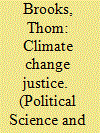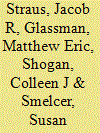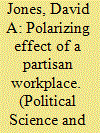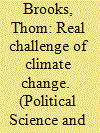|
|
|
Sort Order |
|
|
|
Items / Page
|
|
|
|
|
|
|
| Srl | Item |
| 1 |
ID:
121608


|
|
|
|
|
| Publication |
2013.
|
| Summary/Abstract |
In "The Dog that Didn't Bark: The Role of Canines in the 2008 Campaign," Diana Mutz (2010) argues that dog ownership made voters significantly less likely to vote for Barack Obama in the 2008 presidential election. We examine this claim further. Although President Obama has owned a dog since shortly after his 2008 election, we argue that Bo's presence most likely did little to improve his owner's chances of being reelected in 2012. Rather, the apparent significance of dog ownership uncovered by Mutz is due largely to key variables being omitted from the analysis. Using the same data, we show that Obama didn't so much have trouble with dog owners in 2008 as he had trouble with conservative, rural, Southern whites, who, for reasons we examine, are more likely than other Americans to own dogs. Accordingly, we suspect that Bo failed to boost Obama's vote tally in 2012. While we recognize the tongue-in-jowl tone of portions of Mutz's article, this tale is an important one, and is consistent with recent research linking racial attitudes to levels of support for Barack Obama. We also argue that while scholars are often wise to include control variables such as "South" in studies of political attitudes and behavior, it is important to consider the variety of politically relevant characteristics that such variables may be capturing.
|
|
|
|
|
|
|
|
|
|
|
|
|
|
|
|
| 2 |
ID:
121602


|
|
|
|
|
| Publication |
2013.
|
| Summary/Abstract |
Climate change represents one of our greatest public policy challenges. A broad, well-established and international scientific consensus exists that our planet is undergoing climate change. The question is not whether there is climate change, but how best to respond to it. Climate change is a global phenomenon that requires a global effort unlike anything previously attempted. This global challenge is complicated by related and more controversial questions about causal responsibility. Although convincing evidence shows that climate change is a result of human behavior, much less agreement exists on how this should factor into policy.
|
|
|
|
|
|
|
|
|
|
|
|
|
|
|
|
| 3 |
ID:
121609


|
|
|
|
|
| Publication |
2013.
|
| Summary/Abstract |
Recently, new electronic technologies have supplemented older mechanisms of communication between members of Congress and their constituents. These technologies have enhanced members' options for communication, both with constituents and other interested parties. This research examines member use of one specific electronic communication medium: Twitter. Using original data to examine patterns of use, two models predict the probability of a member adopting Twitter based on political, personal, and district-level variables.
|
|
|
|
|
|
|
|
|
|
|
|
|
|
|
|
| 4 |
ID:
121606


|
|
|
|
|
| Publication |
2013.
|
| Summary/Abstract |
Geoengineering has been roughly defined as "the intentional manipulation of planetary systems at a global scale" (Keith 2000; Schelling 1996). This definition is neither as precise nor as informative as some would like. Nevertheless, we can fix ideas by focusing on the most prominent current proposal, which is to inject sulfate aerosols into the stratosphere to deflect incoming radiation and so cool the Earth's surface. This is a paradigm case: if anything counts as geoengineering, stratospheric sulfate injection (hereafter SSI) does.
|
|
|
|
|
|
|
|
|
|
|
|
|
|
|
|
| 5 |
ID:
121611


|
|
|
|
|
| Publication |
2013.
|
| Summary/Abstract |
Recent efforts to cut public funding for the arts and culture sectors in the United States are couched in the need for balanced budgets and fiscal discipline. Lawmakers who support cuts question whether artistic pursuits such as "cowboy poetry" or artistic endeavors that offend or shock some viewers are an appropriate use of public monies in a depressed economy. While the current debate is grounded in a need for balanced budgets and reduced deficits, long-standing unresolved legacies fragment arts and culture policy and leave arts and culture funding vulnerable to additional cuts. The normative implications for the role of the arts and culture sectors in a democratic society need to be considered.
|
|
|
|
|
|
|
|
|
|
|
|
|
|
|
|
| 6 |
ID:
121610


|
|
|
|
|
| Publication |
2013.
|
| Summary/Abstract |
The workplace provides an exceptional outlet for citizens to encounter different viewpoints and discuss politics with people with whom they may disagree. In Washington, DC, however, many people work in partisan environments where like-minded coworkers rarely encounter alternate points of view. Group polarization theory suggests that these environments push individuals to the partisan and ideological extremes. This study tests this hypothesis by comparing opinion change among interns who worked in a partisan workplace with that of interns who were employed in less-partisan environments. The results suggest that partisan workplace environments foster opinion polarization, especially among Republicans.
|
|
|
|
|
|
|
|
|
|
|
|
|
|
|
|
| 7 |
ID:
121603


|
|
|
|
|
| Publication |
2013.
|
| Summary/Abstract |
We are at a turning point when it comes to the political implications of climate change. Given the reality of a future in a climate-changed world, it is time for us-broadly as a species, but particularly as academics-to move beyond the foci of the last few decades on the politics of preventing climate change through global agreements. There is a growing literature on the obvious need to slow the impacts of climate change, develop postcarbon energy systems, and design new forms of global environmental governance. Beyond these immediate needs, however, climate change poses a range of new problems and requires a broader research agenda for a climate-challenged politics.
|
|
|
|
|
|
|
|
|
|
|
|
|
|
|
|
| 8 |
ID:
121607


|
|
|
|
|
| Publication |
2013.
|
| Summary/Abstract |
Climate change is confirmed by a global scientific consensus. Although no serious disagreement about whether climate change exists, deep controversy remains about what should be done about its many harmful effects. These effects are wide-ranging and include, for example, the increasing threat to coastal wetlands from rising sea levels, the greater likelihood of droughts harming agricultural production, and the spread of tropical diseases (Pachauri and Reisinger 2008). One further effect is the increasing risk of triggering an environmental catastrophe, such as an ice age, that might result in major loss of human lives.
|
|
|
|
|
|
|
|
|
|
|
|
|
|
|
|
| 9 |
ID:
121601


|
|
|
|
|
| Publication |
2013.
|
| Summary/Abstract |
As others have done before me, I am honored to receive the APSA John Gaus Award. As I prepared this lecture, I realized that the Gaus award has been given by APSA 26 times; mine is the 27th. The first was awarded to Herbert Kaufman whose work set a very high standard for this honor. Reviewing the list of the other Gaus award recipients provides a picture of the development of our field. It includes a variety of individuals who represent different approaches to the intersection of public administration and political science. Among the recipients are seven individuals who had a major and personal influence on my work: Aaron Wildavsky, Frank Rourke, George Frederickson, Martha Derthick, Lou Gawthrop, Larry Lynn, and David Rosenbloom. Others are people who have been important to my own intellectual development.
|
|
|
|
|
|
|
|
|
|
|
|
|
|
|
|
| 10 |
ID:
121605


|
|
|
|
|
| Publication |
2013.
|
| Summary/Abstract |
Geoengineering, the "deliberate, large-scale manipulation of the planetary environment in order to counteract anthropogenic climate change" (Shepherd et al. 2009, 1), is attracting increasing interest. As well as the Royal Society, various scientific and government organizations have produced reports on the potential and challenge of geoengineering as a potential strategy, alongside mitigation and adaptation, to avoid the vast human and environmental costs that climate change is thought to bring (Blackstock et al. 2009; GAO 2010; Long et al. 2011; Rickels et al. 2011). "Geoengineering" covers a diverse range of proposals conventionally divided into carbon dioxide removal (CDR) proposals and solar radiation management (SRM) proposals. This article argues that "geoengineering" should not be regarded as a third category of response to climate change, but should be disaggregated. Technically, CDR and SRM are quite different and discussing them together under the rubric of geoengineering can give the impression that all the technologies in the two categories of response always raise similar challenges and political issues when this is not necessarily the case. However, CDR and SRM should not be completely subsumed into the preexisting categories of mitigation and adaptation. Instead, they can be regarded as two parts of a five-part continuum of responses to climate change. To make this case, the first section of this article discusses whether geoengineering is distinctive, and the second situates CDR and SRM in relation to other responses to climate change.
|
|
|
|
|
|
|
|
|
|
|
|
|
|
|
|
| 11 |
ID:
121604


|
|
|
|
|
| Publication |
2013.
|
| Summary/Abstract |
Scholars of justice theory often refuse to apply their principles to concrete social or political issues; instead, they develop those principles in abstraction from contemporary value conflicts or policy debates, preferring to remain silent on how justice might inform controversial political decisions. Rawls, for example, casts questions concerning the application of his "justice as fairness" conception across national, generational, and species boundaries as among the several "problems of extension" for which his theory may or may not be equipped, noting that "the idea of political justice does not cover everything, nor should we expect it to" (1993, 20-21). Even where he applies his justice theory to problems of international relations in his The Law of Peoples, Rawls describes its application as merely "an extension of a liberal conception of justice for a domestic regime to a Society of Peoples" (1999, 9), as though constructing and applying justice principles are entirely discrete steps, with its application to concrete social or political issues a unidirectional project of wielding static principles as practical tools, offering nothing of importance to a normative theory's development.
|
|
|
|
|
|
|
|
|
|
|
|
|
|
|
|
|
|
|
|
|